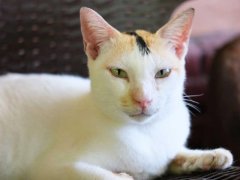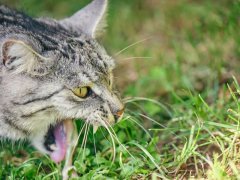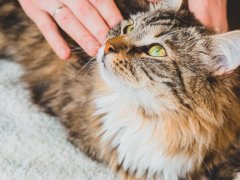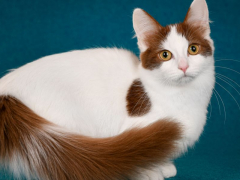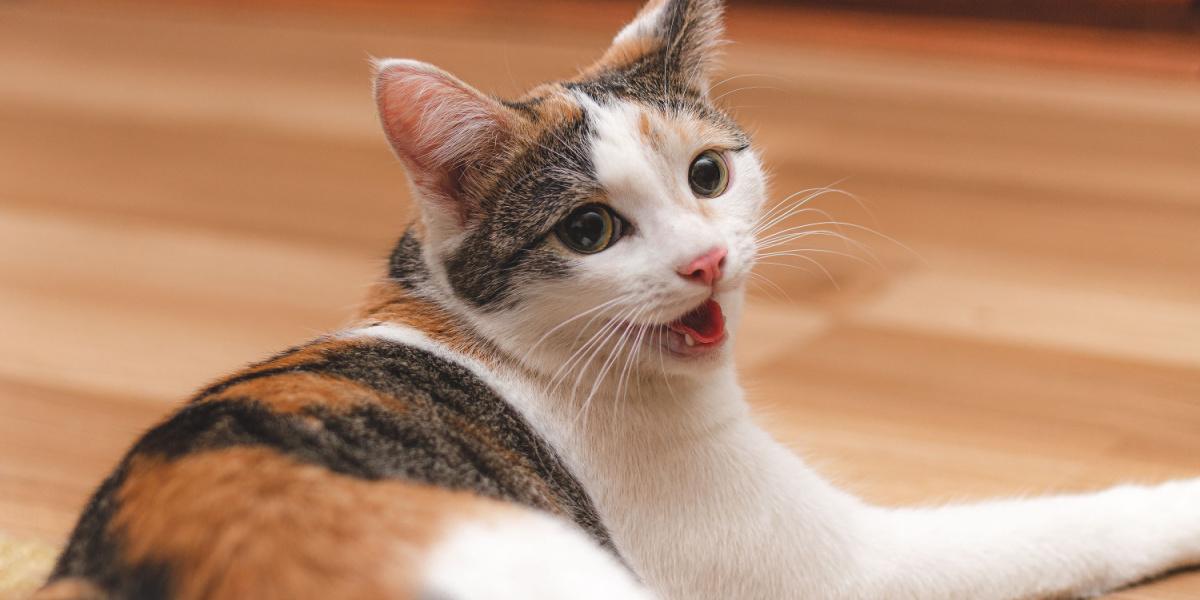
Breathing difficulties are both a symptom of and cause for distress in cats.
The respiratory system, composed of the nose, trachea, and lungs, is a life-giving system that affects a cat’s entire body. Air enters your cat’s body through their nose and moves into their lungs, transferring oxygen into your cat’s blood and nourishing the organs. As oxygen enters your cat’s body through the nostrils, carbon dioxide moves out and into the atmosphere.
The movement of breath is controlled by the respiratory center in your cat’s brain and a network of nerves in their chest. When their body is in balance, your cat’s breath is smooth and moderate without halting, wheezing, or excessive stomach movement. Changes in your cat’s breathing pattern have a world of root causes. They might involve direct trauma or disorder in the respiratory system or could develop as a way to restore homeostasis in the body.
What Is the Normal Respiration Rate for a Cat?
If you’ve ever tried to synchronize your breath with your cat’s and gotten lightheaded in the attempt, you know that cats naturally breathe more rapidly than do humans. While an adult human’s resting respiration rate ranges from 12-16 breaths per minute, a cat might take between 16-30 breaths every minute.
To measure your cat’s resting respiration rate, count the number of breaths your cat takes while sleeping or calm and resting. Each breath is defined as one inhalation and one exhalation. Count the breaths for 30 seconds, then multiply by two to get the number of breaths your cat takes each minute.
Some healthy cats take fewer than 20 breaths per minute while resting, but a number higher than 30 is reason for concern.
Heavy breathing isn’t always rapid, however. Heavy breathing manifests in several forms.
The 3 Types of Heavy Breathing in Cats
Your cat’s heavy breathing can be broken down into three classifications: dyspnea, tachypnea, and panting. Let’s learn more about each type of cat’s heavy breathing.
1. Dyspnea: Labored Breathing
Dyspnea means “difficulty breathing”. Cats with dyspnea may exhibit the following symptoms:
- Increased effort – cat stomach contracting when breathing
- Open-mouthed breathing
- Noisy (wheezing, gasping) breaths
- Nostrils may flare open with each breath
- Restless, unable to settle or sleep
- Extension of head and neck when trying to breath
- Bluish tint to the gums and mucous membranes (cyanosis)
- Distress
2. Tachypnea: Rapid and Shallow Breathing
Tachypnea is when a cat’s respiratory rate rises over the normal level (usually counted as over 40 breaths/minute). Tachypnea can go alongside dyspnea, or can be a sole symptom with the cat breathing fast but otherwise normal.
Rapid breathing can be accompanied by the following symptoms:
- Bluish tint to the gums and mucous membranes (cyanosis)
- Fatigue
3. Panting: Rapid Breathing With the Mouth Open
Cat panting is, essentially, tachypnea with the mouth open.
Panting can be a normal physiological response. However, as cats are usually obligate nasal breathers (always breathe through their nose), panting is a sign of considerable stress to the system—such as through stress, extreme heat or exertion. Panting may also point to serious underlying medical conditions, including heart and lung disease.
Possible Causes of Heavy Breathing in Cats
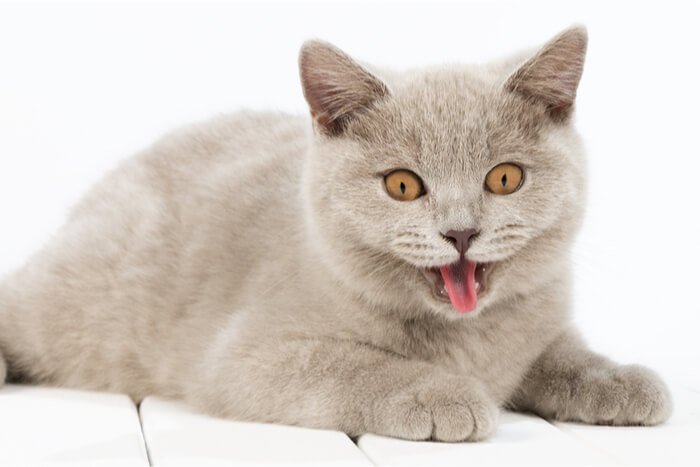
As respiration is such an essential function, stress to almost any bodily system can result in changes to breathing.
There are many potential causes of heavy breathing in cats, although many are related to the heart and respiratory system.
Causes of Dyspnea in Cats
- Disorders of the trachea, including foreign objects stuck in the throat, tumors, or an elongated soft palate
- Nasal disorders, including undersized nostrils, infections, tumors, or bleeding.
- Diseases of the lungs and lower windpipe, such as infections, pneumothorax, fluid in the lungs, heartworms, or tumors.
- Disorders in the chest wall, including physical trauma and paralysis caused by toxins.
- Congestive heart failure
- Disorders in the abdomen, such as an enlarged liver, bloating, or fluid buildup.
Causes of Tachypnea in Cats
- Hypoxemia (low oxygen levels in the blood)
- Anemia (decreased red blood cell count)
- Lung cancer
- Heart failure
- Heartworms
- Fever, which can cause tachypnea as your cat breathes rapidly in an attempt to cool down their body
- Stress, such as from travel or vet visits or when coming across another animal outdoors
Causes of Panting in Cats
- Heat: Just like dogs, cats use panting as a thermoregulation mechanism, although less commonly than their canine friends. This open-mouthed rapid breathing helps them to manage their body temperature in hot weather. Panting can be a sign of heatstroke.
- Exertion: Cats can pant when exercising or playing. This may happen because your cat is overweight, or it could be a normal response to continued exertion, especially if the weather is warm.
- Stress: This is a common source of panting. Cats often pant when they’re in the car or while at the veterinarian.
- Heart problems: Complications such hypertrophic cardiomyopathy (abnormally thickened heart muscles) could cause panting.
- Asthma: In addition to coughing, hacking, and wheezing, some asthmatic cats pant.
When to Call the Vet
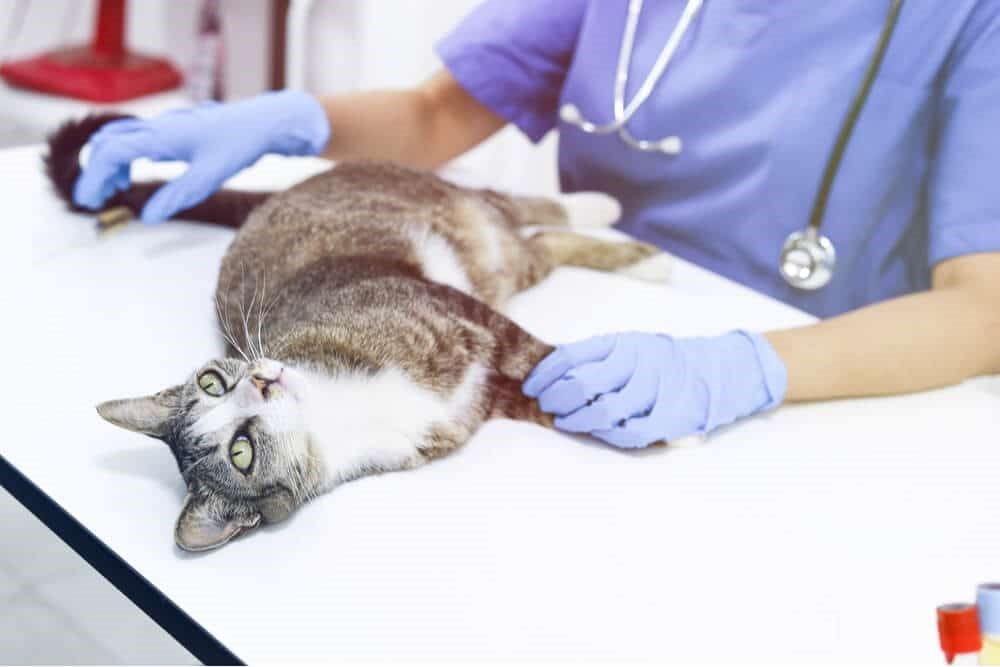
Heavy breathing can indicate a serious medical concern in cats, and should warrant a veterinary trip.
Most cases of heavy breathing in cats require urgent veterinary attention. Cats breathing with their mouth open, with noisy breaths, or with significant effort to take in breaths should be taken to a veterinarian as an emergency.
A cat breathing heavily while resting, cool and calm, should be taken for veterinary attention. A resting respiration rate of over 30 is considered unusual and anything over 40 breaths/minute should be treated as urgent.
If your cat is breathing rapidly while hot, stressed or having been exercising, this may be a temporary response. Bring them into a cool, calm environment, and encourage them to have water and rest. If their breathing doesn’t quickly return to normal, contact a DVM veterinarian as they may have an underlying issue such as heatstroke.
Treatment of Heavy Breathing in Cats
If your cat is in respiratory distress, they should be seen urgently by a vet. They will likely need immediate stabilization with oxygen therapy as an emergency measure, along with other treatments such as a mild sedative and fluid assessment.
Your vet will look for the underlying problem causing the changes to breathing. This may include bloodwork, x-rays or ultrasound scans and assessing for any fluid in the chest or abdomen.
Treatment will depend on the underlying cause. Many cats will require oxygen supplementation, alongside medications to help open up the airways and reduce any fluid build-up.
Prevention of Cat Breathing Heavily
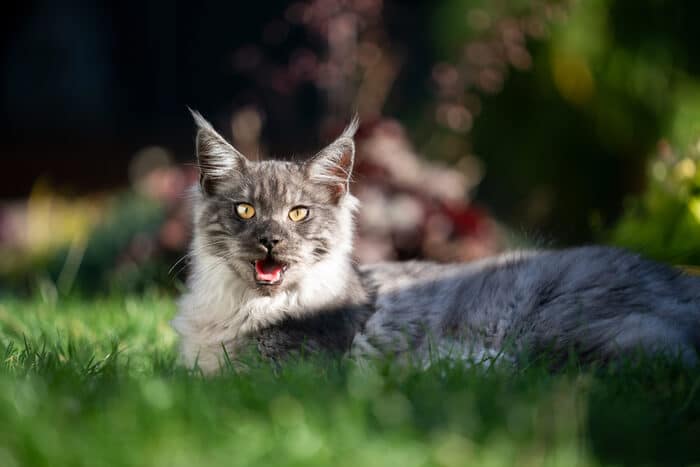
If a cat is panting due to heat, move them into a cool, shaded or indoor area and encourage them to drink.
Many causes of respiratory difficulties cannot be prevented, as they often involve underlying health issues such as heart of lung disease. It is recommended for cats to have regular veterinary check-ups.
There are some measures to take to prevent physiological causes of rapid or open mouthed breathing.
- Ensure cats have a cool place to rest in hot weather, and plenty of cool, fresh water to avoid heatstroke.
- Avoid sources of stress where possible.
- When playing or exercising your cat, provide plenty of opportunity to rest.
